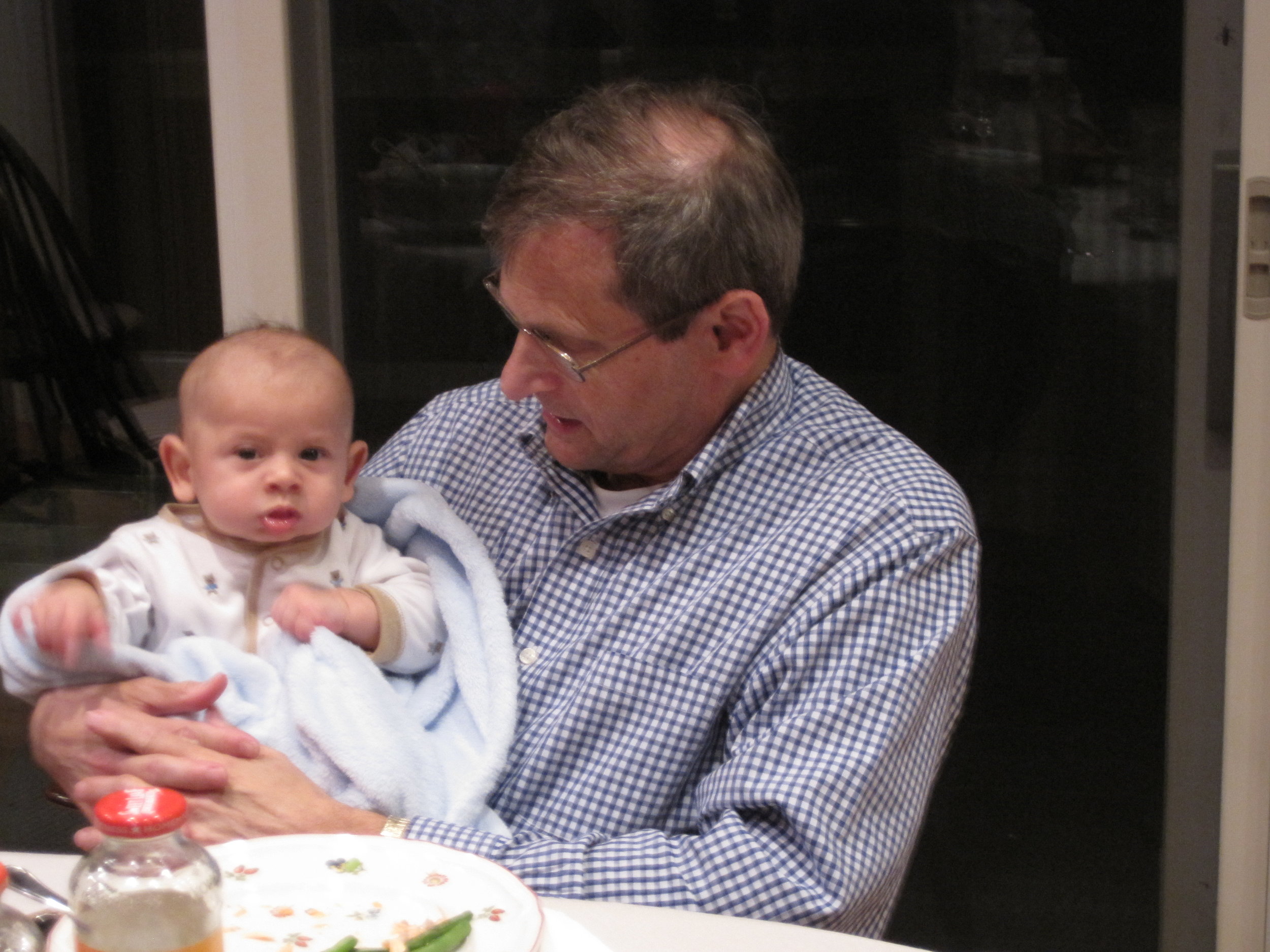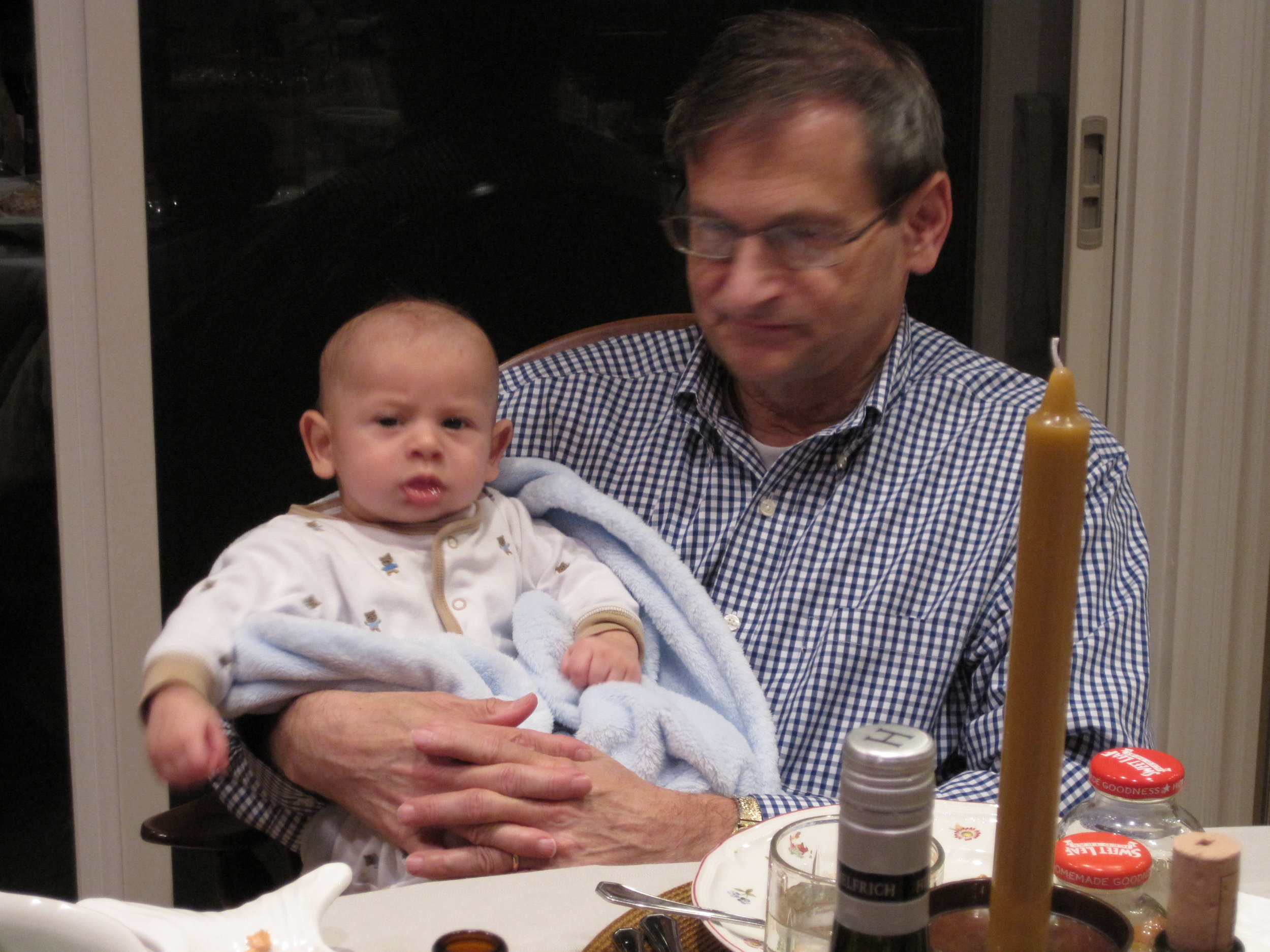Letting Go
My dad went into hospice yesterday morning. It seems surreal to be writing this, to be facing the fact that he’s dying. Yes, we knew it would happen eventually, but it seemed so far off, so remote, like the idea of the kids going off to college someday. Except, like most things, it sneaks up on you, so even though you’re conscious of the passage of time, and of things changing—children going from elementary school to middle school to high school, or in this case, my father getting weaker and frailer by the day—that when it happens it arrives with such intensity it’s like getting hit in the face with a tidal wave when you expected to dunk your feet in the kiddy pool.
I went to see him on Saturday. I got there at around 11 am, holding my cup of coffee and beaming with false cheer to try to perk my father up. “I’m Dr. Levine’s daughter,” I chirped Stepford wife like to the receptionist at the nurses station, and her face changed. “You need to speak to him,” she said, pointing frantically at the nurse typing away next to her.
“Oh my dear,” he said, stopping to look at me. He was balding, with longish blonde hair, the typical hippyish male nurse you’d expect to see at a hospital in western Massachusetts. “I’m so sorry.”
It turns out the oncologist had showed up during afternoon rounds the day before and broken the news to my parents that there was really nothing more to do. My father’s myeloma had returned with a vengeance, and even the newest third generation drugs would only buy him a couple more months. My father had been his typically stoic self while the doctor told him. “I’m done,” he said flatly when the oncologist asked him what he wanted to do. “No more.”
But later that night, when my mother left, he broke. Completely expected, given what he was going through, but now he was under psych watch with a Constant Companion.
“Jesus,” I said, and then, furious, “why doesn't anyone ever tell me these things?” And then I realized that my mother had probably been waiting to tell me in person.
I went into his room. “Daddy,” I said helplessly. He didn’t respond. He was lying on the bed, hands clenched around the white hospital blanket. Over the last few days, he had gotten even more painfully thin. But his face was still unlined and he looked so much younger than his 69 years. He reminded me suddenly of Teddy, sleeping at night with his hands clutched around his blankie in a death grip.
“Has he been like this all morning?” I asked the petite woman sitting on the chair in front of him.
She looked at me nervously. “I don’t know,” she said. “I’m just covering for his Companion. She went to lunch.”
“Can you leave please?" I asked. I didn’t want some stranger gawking at my father. It violated his dignity.
She looked at me helplessly. “I can’t,” she said.
I gritted my teeth, ready for a standoff but just then my mother arrived and whisked me off to speak to the oncology fellow, an earnest young man who was surprisingly sensitive and compassionate despite my reservations that he looked like he was barely out of medical school.
Apparently the shit had hit the fan at about 3 am, when my father had become agitated and started demanding a knife so he could end it right then, which had prompted the arrival of his Constant Companion. “You know, I really don’t think your father needs all these precautions,” the fellow said cautiously. “I don’t think he’s suicidal. I think he’s just speaking as a former surgeon. He wants to make death quick and decisive, slashing life like a scapel rather than drawing it out."
My mother and I both nodded. We knew what he was getting at. My father is both brilliant and pragmatic. He knew exactly what was going to happen to him, and, as my father’s daughter, I knew what he was fearing most. The total loss of control.
“What would you do?” I asked the oncologist. “What would you do if it were your father?”
He looked incredibly uncomfortable. “I can’t really answer that,” he said, and then he started rambling about how he tended to be incredibly emotional and thought from emotion rather than reason, and how he’d been in a similar situation and everyone in his family had looked to him for answers, and how he’d really, really wanted to keep the person around. And then he thought about it, and he realized it was for selfish reasons, that he wanted that person in his life, and that he didn’t want this person—whom he loved dearly—to suffer anymore.
So I knew what he was saying. It was time to let my father go.
There are no words to really express what I’m feeling right now, and no words to express what my father is going through. It just hurts, so badly, and the pain is just so raw. My father didn’t really talk the rest of the afternoon. He lay on his bed and answered questions in monosyllabic yeses or nos. I tried talking, making jokes, holding his hand, sometimes just sitting reading the newspaper and editorializing out loud. I told him about the kids. Jo Jo had transitioned to big girl panties. Teddy had learned to ride his new tricycle. Geoffrey was saying “hi mama.” But he had closed himself off. I felt as distant from him as if I were three continents over.
Then we heard on the news that there was a tornado watch in Connecticut. My mother started freaking out and went out of the room to call her dog’s babysitter (yes, her dog has a babysitter) to ask him to turn on the weather channel to find out what was going on. I listlessly surfed the Internet.
“Hallie.” I turned towards my father.
“Yes, Daddy?” I said eagerly.
“GO HOME.” He said forcefully.
I wasn’t expecting him to say that. “Huh?” I said.
“I SAID GO HOME.” He was dragging the words out with effort, but he sounded exactly like the father I had known for the past 39 years. “I DON’T WANT YOU DRIVING THROUGH A TORNADO.”
“Daddy,” I said helplessly. I wanted him to keep talking, but I didn’t know what to say.
“HALLIE. GO HOME. NOW.”
Even weak and helpless in a hospital bed, I knew I was no match for my father. I packed up my laptop and left with my mother.
“She’s staying in Amherst with me tonight,” my mother told him.
“Good,” he said tonelessly.
When we got to my parents’ house my mother started dinner while I went into my father’s office to look at old pictures. It was so strange to be in there, to see his computer and his beloved bookshelves piled high with books and his meticulously arranged files and know he would never be in there again. I pulled a bunch of albums out of the cabinets and began flipping through. One album was filled with photos from a Caribbean vacation from twenty five years ago, picture after picture of me and my sister and my mother on the beach. There were only a handful of my father, and I realized it was because he had always been the one taking the photographs. But I didn’t want these pictures of me and my sister, smiling dorkily at the camera with our huge thick rimmed glasses. I wanted pictures of him.
“Your sister spent all night looking through those albums too,” my mother said matter of factly, coming into the room.
There was a stack of photos pushed a bit further back in the cabinet, wrapped in a rubber band. I pulled them out to find a pile of black and white photos. There was my father as an infant, staring wide eyed at the camera sandwiched in between his parents. There were photos of my grandparents, my grandmother posed, hip jutted out, in a tankini while my grandfather beamed shirtless beside her. Then there was a picture of my father, age 4, wearing a white shirt with bumblebees emblazoned on it as he pushed his baby brother in the stroller.
I stared at it. My father was the spitting image of Teddy. Everything—the dark hair, the tilt of the ears, the pointed chin with its slight cleft, the smile, even the way he leaned against the stroller. I knew, just taking in the picture, that my father had insisted on pushing his baby brother in the stroller all by “his self.” I knew, because that’s exactly what my son would have done.
“Mommy, look,” I said, showing her.
She looked hard at the picture for a moment. “Wow,” she said, drawing in her breath.
I took the photo home with me. It’s in my night table drawer, and I pull it out occasionally, just staring at the picture, marveling at the likeness.
We’ve always joked that Teddy is my father’s doppelganger, not just in his looks, but in his behavior. But while I’ve always known that, it takes such new meaning now. I’ll always have some of my father with me, every time I hold my son.
And Teddy is like my father. He has the same sensitivity, the same compassion, the same stubbornness, the same temper. He’s still a baby, and his little feet barely fit into his preschool size Stride Rite sneakers. It will take a while before he’s ready to fill my father’s sturdy brown loafers, to become the man his Pop Pop is.
But I know he’ll get there.

